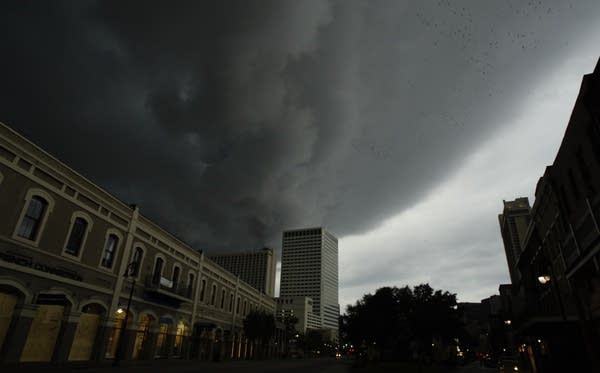A hardened few choose to stay and ride out Gustav

With 16 adults, six young children and five dogs roaming the decks, the "Captain Rayne" looked more like Noah's Ark than a crew boat that ferries workers back and forth to offshore oil rigs. And skipper John Lyons fully expects his vessel to bring his family and friends safely through whatever Hurricane Gustav dishes out, no matter how biblical.
"I'm a survivor, I'm a pirate," said the gray-bearded, heavily tattooed mariner, who tied his craft up to a bridge in Bayou Terrebonne in Houma. "I feel safer on this boat than I do in that house. I been doing this all my life."
Tens of thousands heeded mandatory evacuation orders and fled the Gulf Coast as Gustav made its way ashore. But even in places that were virtually wiped from the map by Katrina three years ago, many stubbornly refused to go.
"I'm not going nowhere," carpenter Gerald LeBlanc declared from the porch of his home in St. Bernard Parish east of New Orleans, where nearly every structure was heavily damaged of destroyed in Katrina. "I'm staying right here."
Create a More Connected Minnesota
MPR News is your trusted resource for the news you need. With your support, MPR News brings accessible, courageous journalism and authentic conversation to everyone - free of paywalls and barriers. Your gift makes a difference.

Never mind that LeBlanc's one-story house in the parish seat of Chalmette was flooded to the roof, and that his father had to kick his way out of the attic three years ago. If it gets that bad, LeBlanc has an orange life preserver for himself and a boogie board for his family's dachshund, Oscar.
"You come into this world alone, and sometimes you've got to go it alone," he said as Oscar munched on bacon. "I'm tired of running."
East of New Orleans, all of St. Bernard Parish was under a 24-hour curfew. But even the threat of a one-way trip to Angola State Prison if he ventured outside wasn't enough to keep Anthony Stipelcovich off the streets.
The 42-year-old made several miles-long round trips on foot, ferrying his dog, seven cats, and aquariums of hamsters and mice atop a plastic gardening cart to his sister's home in Arabi.
"The curfew is too strict," said Stipelcovich, wearing a visor and white washcloth to shield his head and neck from the brutal sun. "Even in a war zone, even in Iraq, dawn to dusk is the norm."

Stipelcovich got into an argument with sheriff's deputies during one round, but managed to talk his way out of it.
"I guess they were just being compassionate, being merciful," he said. "I'm glad they didn't do that. I'm saving my pets."
Orleans Parish was also ordered evacuated, and most seemed unwilling to face a repeat of 2005, when thousands languished - and some died - in the filth and swelter of the Superdome and convention center. Bourbon Street was littered with the detritus of a last-minute party - plastic cups, Mardi Gras beads and packaged condoms - and the revelers were largely gone. But the French Quarter was far from empty.
Hattie Callan, 36, weaved her way down the street Sunday, a vodka drink already in her hand and it only 9:20 in the morning. She was staying behind to watch over several houses, and she wasn't worried.
"I've got liquor, cash, food, ammo and weed," she said as she floated out of sight.

Up Chartres Street from St. Louis Cathedral, a whole different notion of emergency gear prevailed.
"Do you have a drip pot?" Bill Campbell shouted to a neighbor from a deck chair on the street corner.
The retired convenience store manager fled to southern Florida in 2005. When he returned, he found his three-story condo in an old Catholic school gymnasium suffered a sole broken window.
"We're probably going to lose power, probably going to lose water," he said. "We have water for days, food for days. We have provisions. We're going to be fine."
But what of Mayor Ray Nagin's dire warnings that this could be one for the record books?

"I think he's an idiot," said Ott Howell, a docent at a local mansion who is staying put in his 1826 slave quarter home. "I thought he was an idiot in Katrina."
Jeffrey Carreras is staying for more practical reasons. His Garden District restaurant, Parasol's, was looted after he evacuated for Katrina.
"I have shotguns, rifles - I collect guns actually," he said. "So I have plenty of guns in there, plenty on ammo."
Back in Houma, Pam Walling and boyfriend Dain Langley stayed behind because of their two Labradors - a yellow named My Jewel and a black Katrina-rescue dog named Sarabell that runs indoors at the first drop of rain. Dain was volunteering at the local animal shelter when he spotted Sarabell, two days away from being euthanized.
"We have emergency floaties for the dogs, just in case we have to send them out swimming," he said. "Dogs out first, like children. ... The helicopters come, they go first."
On the "Captain Rayne," Lyons and his wife, Mavis, were frying up fish in the galley while the others sat in the air-conditioned passenger area, watching the weather forecast. Other shelters might blow down or sink under the surge, but the skipper expects his boat to ride the tide just fine.
"I wouldn't put my family in jeopardy," he said. "I don't think I did. I hope I didn't, put it that way."
---
(Copyright 2008 by The Associated Press. All Rights Reserved.)
